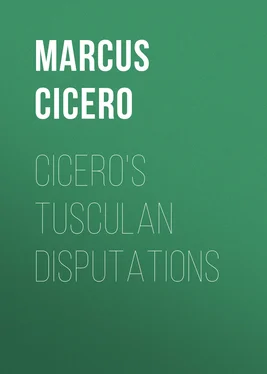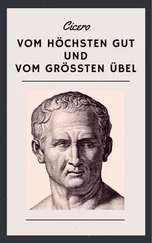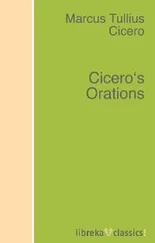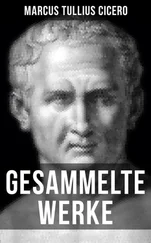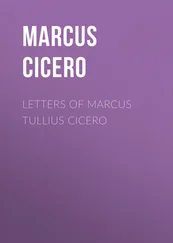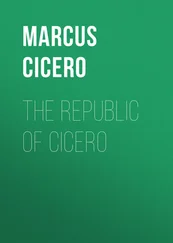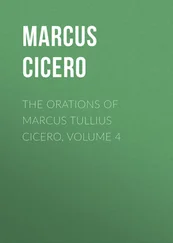Marcus Cicero - Cicero's Tusculan Disputations
Здесь есть возможность читать онлайн «Marcus Cicero - Cicero's Tusculan Disputations» — ознакомительный отрывок электронной книги совершенно бесплатно, а после прочтения отрывка купить полную версию. В некоторых случаях можно слушать аудио, скачать через торрент в формате fb2 и присутствует краткое содержание. Издательство: Иностранный паблик, Жанр: foreign_antique, Философия, foreign_edu, на английском языке. Описание произведения, (предисловие) а так же отзывы посетителей доступны на портале библиотеки ЛибКат.
- Название:Cicero's Tusculan Disputations
- Автор:
- Издательство:Иностранный паблик
- Жанр:
- Год:неизвестен
- ISBN:нет данных
- Рейтинг книги:3 / 5. Голосов: 1
-
Избранное:Добавить в избранное
- Отзывы:
-
Ваша оценка:
- 60
- 1
- 2
- 3
- 4
- 5
Cicero's Tusculan Disputations: краткое содержание, описание и аннотация
Предлагаем к чтению аннотацию, описание, краткое содержание или предисловие (зависит от того, что написал сам автор книги «Cicero's Tusculan Disputations»). Если вы не нашли необходимую информацию о книге — напишите в комментариях, мы постараемся отыскать её.
Cicero's Tusculan Disputations — читать онлайн ознакомительный отрывок
Ниже представлен текст книги, разбитый по страницам. Система сохранения места последней прочитанной страницы, позволяет с удобством читать онлайн бесплатно книгу «Cicero's Tusculan Disputations», без необходимости каждый раз заново искать на чём Вы остановились. Поставьте закладку, и сможете в любой момент перейти на страницу, на которой закончили чтение.
Интервал:
Закладка:
The hallow’d roofs of Acheron, the dread
Of Orcus, the pale regions of the dead.
And does it become a philosopher to boast that he is not afraid of these things, and that he has discovered them to be false? And from this we may perceive how acute these men were by nature, who, if they had been left without any instruction, would have believed in these things. But now they have certainly made a very fine acquisition in learning that when the day of their death arrives, they will perish entirely. And if that really is the case—for I say nothing either way—what is there agreeable or glorious in it? Not that I see any reason why the opinion of Pythagoras and Plato may not be true; but even although Plato were to have assigned no reason for his opinion (observe how much I esteem the man), the weight of his authority would have borne me down; but he has brought so many reasons, that he appears to me to have endeavored to convince others, and certainly to have convinced himself.
XXII. But there are many who labor on the other side of the question, and condemn souls to death, as if they were criminals capitally convicted; nor have they any other reason to allege why the immortality of the soul appears to them to be incredible, except that they are not 31able to conceive what sort of thing the soul can be when disentangled from the body; just as if they could really form a correct idea as to what sort of thing it is, even when it is in the body; what its form, and size, and abode are; so that were they able to have a full view of all that is now hidden from them in a living body, they have no idea whether the soul would be discernible by them, or whether it is of so fine a texture that it would escape their sight. Let those consider this, who say that they are unable to form any idea of the soul without the body, and then they will see whether they can form any adequate idea of what it is when it is in the body. For my own part, when I reflect on the nature of the soul, it appears to me a far more perplexing and obscure question to determine what is its character while it is in the body—a place which, as it were, does not belong to it—than to imagine what it is when it leaves it, and has arrived at the free æther, which is, if I may so say, its proper, its own habitation. For unless we are to say that we cannot apprehend the character or nature of anything which we have never seen, we certainly may be able to form some notion of God, and of the divine soul when released from the body. Dicæarchus, indeed, and Aristoxenus, because it was hard to understand the existence and substance and nature of the soul, asserted that there was no such thing as a soul at all. It is, indeed, the most difficult thing imaginable to discern the soul by the soul. And this, doubtless, is the meaning of the precept of Apollo, which advises every one to know himself. For I do not apprehend the meaning of the God to have been that we should understand our members, our stature, and form; for we are not merely bodies; nor, when I say these things to you, am I addressing myself to your body: when, therefore, he says, “Know yourself,” he says this, “Inform yourself of the nature of your soul;” for the body is but a kind of vessel, or receptacle of the soul, and whatever your soul does is your own act. To know the soul, then, unless it had been divine, would not have been a precept of such excellent wisdom as to be attributed to a God; but even though the soul should not know of what nature itself is, will you say that it does not even perceive that 32it exists at all, or that it has motion? On which is founded that reason of Plato’s, which is explained by Socrates in the Phædrus, and inserted by me, in my sixth book of the Republic.
XXIII. “That which is always moved is eternal; but that which gives motion to something else, and is moved itself by some external cause, when that motion ceases, must necessarily cease to exist. That, therefore, alone, which is self-moved, because it is never forsaken by itself, can never cease to be moved. Besides, it is the beginning and principle of motion to everything else; but whatever is a principle has no beginning, for all things arise from that principle, and it cannot itself owe its rise to anything else; for then it would not be a principle did it proceed from anything else. But if it has no beginning, it never will have any end; for a principle which is once extinguished cannot itself be restored by anything else, nor can it produce anything else from itself; inasmuch as all things must necessarily arise from some first cause. And thus it comes about that the first principle of motion must arise from that thing which is itself moved by itself; and that can neither have a beginning nor an end of its existence, for otherwise the whole heaven and earth would be overset, and all nature would stand still, and not be able to acquire any force by the impulse of which it might be first set in motion. Seeing, then, that it is clear that whatever moves itself is eternal, can there be any doubt that the soul is so? For everything is inanimate which is moved by an external force; but everything which is animate is moved by an interior force, which also belongs to itself. For this is the peculiar nature and power of the soul; and if the soul be the only thing in the whole world which has the power of self-motion, then certainly it never had a beginning, and therefore it is eternal.”
Now, should all the lower order of philosophers (for so I think they may be called who dissent from Plato and Socrates and that school) unite their force, they never would be able to explain anything so elegantly as this, nor even to understand how ingeniously this conclusion is drawn. The soul, then, perceives itself to have motion, 33and at the same time that it gets that perception, it is sensible that it derives that motion from its own power, and not from the agency of another; and it is impossible that it should ever forsake itself. And these premises compel you to allow its eternity, unless you have something to say against them.
A. I should myself be very well pleased not to have even a thought arise in my mind against them, so much am I inclined to that opinion.
XXIV. M. Well, then, I appeal to you, if the arguments which prove that there is something divine in the souls of men are not equally strong? But if I could account for the origin of these divine properties, then I might also be able to explain how they might cease to exist; for I think I can account for the manner in which the blood, and bile, and phlegm, and bones, and nerves, and veins, and all the limbs, and the shape of the whole body, were put together and made; ay, and even as to the soul itself, were there nothing more in it than a principle of life, then the life of a man might be put upon the same footing as that of a vine or any other tree, and accounted for as caused by nature; for these things, as we say, live. Besides, if desires and aversions were all that belonged to the soul, it would have them only in common with the beasts; but it has, in the first place, memory, and that, too, so infinite as to recollect an absolute countless number of circumstances, which Plato will have to be a recollection of a former life; for in that book which is inscribed Menon, Socrates asks a child some questions in geometry, with reference to measuring a square; his answers are such as a child would make, and yet the questions are so easy, that while answering them, one by one, he comes to the same point as if he had learned geometry. From whence Socrates would infer that learning is nothing more than recollection; and this topic he explains more accurately in the discourse which he held the very day he died; for he there asserts that, any one, who seeming to be entirely illiterate, is yet able to answer a question well that is proposed to him, does in so doing manifestly show that he is not learning it then, but recollecting it by his memory. Nor is it to be accounted for in any other way, how children 34come to have notions of so many and such important things as are implanted, and, as it were, sealed up, in their minds (which the Greeks call ἔννοιαι), unless the soul, before it entered the body, had been well stored with knowledge. And as it had no existence at all (for this is the invariable doctrine of Plato, who will not admit anything to have a real existence which has a beginning and an end, and who thinks that that alone does really exist which is of such a character as what he calls εἴδεα, and we species), therefore, being shut up in the body, it could not while in the body discover what it knows; but it knew it before, and brought the knowledge with it, so that we are no longer surprised at its extensive and multifarious knowledge. Nor does the soul clearly discover its ideas at its first resort to this abode to which it is so unaccustomed, and which is in so disturbed a state; but after having refreshed and recollected itself, it then by its memory recovers them; and, therefore, to learn implies nothing more than to recollect. But I am in a particular manner surprised at memory. For what is that faculty by which we remember? what is its force? what its nature? I am not inquiring how great a memory Simonides 13 13 The Simonides here meant is the celebrated poet of Ceos, the perfecter of elegiac poetry among the Greeks. He flourished about the time of the Persian war. Besides his poetry, he is said to have been the inventor of some method of aiding the memory. He died at the court of Hiero, 467 b.c.
may be said to have had, or Theodectes, 14 14 Theodectes was a native of Phaselis, in Pamphylia, a distinguished rhetorician and tragic poet, and flourished in the time of Philip of Macedon. He was a pupil of Isocrates, and lived at Athens, and died there at the age of forty-one.
or that Cineas 15 15 Cineas was a Thessalian, and (as is said in the text) came to Rome as ambassador from Pyrrhus after the battle of Heraclea, 280 b.c., and his memory is said to have been so great that on the day after his arrival he was able to address all the senators and knights by name. He probably died before Pyrrhus returned to Italy, 276 b.c.
who was sent to Rome as ambassador from Pyrrhus; or, in more modern times, Charmadas; 16 16 Charmadas, called also Charmides, was a fellow-pupil with Philo, the Larissæan of Clitomachus, the Carthaginian. He is said by some authors to have founded a fourth academy.
or, very lately, Metrodorus 17 17 Metrodorus was a minister of Mithridates the Great; and employed by him as supreme judge in Pontus, and afterward as an ambassador. Cicero speaks of him in other places (De Orat. ii. 88) as a man of wonderful memory.
35the Scepsian, or our own contemporary Hortensius 18 18 Quintus Hortensius was eight years older than Cicero; and, till Cicero’s fame surpassed his, he was accounted the most eloquent of all the Romans. He was Verres’s counsel in the prosecution conducted against him by Cicero. Seneca relates that his memory was so great that he could come out of an auction and repeat the catalogue backward. He died 50 b.c.
: I am speaking of ordinary memory, and especially of those men who are employed in any important study or art, the great capacity of whose minds it is hard to estimate, such numbers of things do they remember.
Интервал:
Закладка:
Похожие книги на «Cicero's Tusculan Disputations»
Представляем Вашему вниманию похожие книги на «Cicero's Tusculan Disputations» списком для выбора. Мы отобрали схожую по названию и смыслу литературу в надежде предоставить читателям больше вариантов отыскать новые, интересные, ещё непрочитанные произведения.
Обсуждение, отзывы о книге «Cicero's Tusculan Disputations» и просто собственные мнения читателей. Оставьте ваши комментарии, напишите, что Вы думаете о произведении, его смысле или главных героях. Укажите что конкретно понравилось, а что нет, и почему Вы так считаете.
